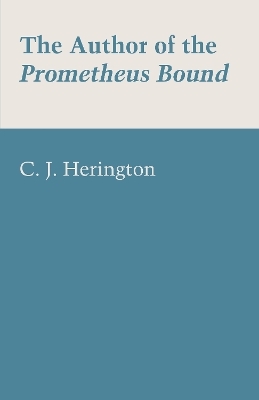
The Author of the Prometheus Bound
University of Texas Press (Verlag)
978-1-4773-0420-4 (ISBN)
- Lieferbar (Termin unbekannt)
- Versandkostenfrei innerhalb Deutschlands
- Auch auf Rechnung
- Verfügbarkeit in der Filiale vor Ort prüfen
- Artikel merken
The Prometheus Bound has proved to be both the most problematic and the most influential of extant Greek tragedies. Especially during the past two hundred years the character here created has transcended the boundaries of nationality, ideology, and race: Goethe, Shelley, Marx, and—to judge by other published translations—modern Russia and China have in turn been fascinated by this being who is tortured by the gods for furthering the progress of humanity. Yet the interpretation of the play itself and its relation to the group of now-lost plays with which it was originally produced continue to arouse violent controversy. At the center of the controversy stand the questions, raised with increasing urgency during the twentieth century, whether the play is by Aeschylus at all and when it was written.
This monograph attempts a systematic answer to these questions. It first surveys the general conditions of the authenticity problem as they appeared after the redating of Aeschylus’ Supplices. Next, it catalogues in detail the stylistic, metrical, and thematic features of the Prometheus that have been supposed to tell against Aeschylus’ authorship. Finally, it suggests that these phenomena will not make sense on the assumption that the play was written by anyone other than Aeschylus, and that the date of composition must fall after the Oresteia, in the last two years of Aeschylus’ life. Given this definite context and date, many of the apparent problems of the Prometheus Bound either fall away or at least can be more precisely formulated by reference to the other extant tragedies of Aeschylus’ latest phase.
C. J. Herington (1924–1997) taught classics at several universities.
Chapter I. General Considerations: Criteria
Chapter II. First Criterion: Minor Stylistic and Metrical Phenomena
1. Unparalleled in Dramatic Poetry
a) Choric quatrains
b) Formal pattern in line arrangement
c) Unparalleled frequency of word and phrase repetition
2. Unparalleled in Tragedy
a) Initial rho preceded by a short vowel not constituting a long syllable
b) Interlinear hiatus after trimeters without stop
3. Unparalleled in the Extant Plays and Fragments of Aeschylus
a) Uses of the definite article
b) High proportion of resultative perfects
c) High proportion of first-foot anapaests in the trimeters
d) High proportion of enjambment
e) 1:2 stichomythia
f) Metron overlap in anapaestic dimeters
g) Dactylo-epitrite meter
4. Confined to (or Predominant in) PV, Su, Oresteia
a) Lieblingswörter
b) “Ellipse” of the first and second persons of εἰμí
c) δεî
d) πέπρωται
e) Address formulae
f) ὰπαλλαγἠ πόνων
g) εύμενἠς βία
h) Metrical statistics
5. Particles in the Prometheus
Chapter III. Second Criterion: Cosmic View and Trilogic Composition
1. Fundamental Difference in Cosmic Background between the Two Groups, Pe-Se and Su-Oresteia-PV
2. Trilogic Structure
3. Influence of Old Comedy
4. Appearances of the Gods on Stage
5. Zeus
6. Tormented Wanderer
7. Conclusion
Chapter IV. Miscellaneous Items Perhaps Bearing on Date or Authenticity
1. The Third Speaking Part
2. Dramatic Character of the Prologue (1–87)
3. Two Allegedly Sophoclean Features
a) The Hero
b) Pity and Fear
4. The Monodies
5. Pre-Socratic Echoes in Sutriology, Oresteia, and
6. Sophistic/Rhetorical Echoes in the Prometheus
Chapter V. Résumé of the Results of Chapters II, III, and IV
Chapter VI. Some Conclusions
Appendix A. The Components of the Prometheia
Appendix B. External Grounds for Dating the Prometheus
Bibliography
| Verlagsort | Austin, TX |
|---|---|
| Sprache | englisch |
| Maße | 140 x 216 mm |
| Gewicht | 454 g |
| Themenwelt | Geisteswissenschaften ► Sprach- / Literaturwissenschaft ► Anglistik / Amerikanistik |
| Geisteswissenschaften ► Sprach- / Literaturwissenschaft ► Latein / Altgriechisch | |
| Geisteswissenschaften ► Sprach- / Literaturwissenschaft ► Literaturwissenschaft | |
| ISBN-10 | 1-4773-0420-7 / 1477304207 |
| ISBN-13 | 978-1-4773-0420-4 / 9781477304204 |
| Zustand | Neuware |
| Haben Sie eine Frage zum Produkt? |
aus dem Bereich


